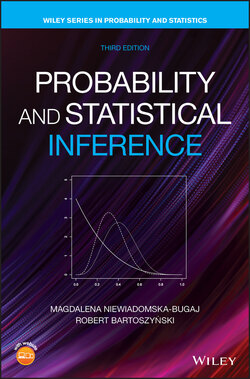Читать книгу Probability and Statistical Inference - Robert Bartoszynski - Страница 37
Example 1.18
ОглавлениеLet and let consist of all subsets of that are finite. is closed under finite unions and all intersections, finite or not. Indeed, if are finite sets, then is also finite. Similarly, if are finite, then , and hence is also finite. However, is not closed under complementation: if is finite (), then is not finite, and hence . On the other hand, if is the class of all subsets of that contain some fixed element, say 0, then is closed under all intersections and unions, but it is not closed under complementation.
The following concepts have an important role in the theory of probability.
Definition 1.4.2 A nonempty class of subsets of that is closed under complementation and all finite operations (i.e., finite union, finite intersection) is called a field. If is closed under complementation and all countable operations, it is called a ‐field. Finally, if is closed under monotone passage to the limit,4 it is called a monotone class.
Let us observe that Definition 1.4.2 can be formulated in a more efficient way. For to be a field, it suffices to require that if , then and (or and ). Any of these two conditions implies (by induction and De Morgan's laws) the closure of under all finite operations. Consequently, for to be a ‐field, it suffices to require that whenever then and (or and ); this follows again from De Morgan's laws.5
It is important to realize that closure under countable operations is stronger than closure under any finite operations. This means that there exist classes of sets that are fields but not ‐fields. This is illustrated by the following example:
